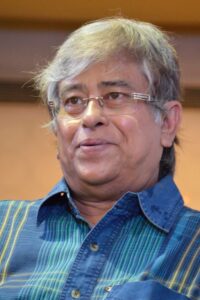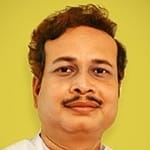INTERVIEWED BY BISWAJIT PANDA AND TRANSLATED BY ADRIJA GHOSH.

Swapnamoy Chakraborty
Swapnamoy Chakraborty was born in Kolkata. He started his writing career with short stories. His first short story was published in 1972, and Chakraborty’s first book Bhumi Sutrawas published in 1982. His book Abantinagar won the Bankim Puraskar in 2005. His work is both critically acclaimed and well-received by readers.
The interview started off with Biswajit Panda asking Swapnamoy Chakraborty how he was doing these days, only with Chakraborty quoting Tagore. The interview opened in the mammoth presence of Kabiguru and went something like this…
Biswajit: How are you?
Swapnamoy: I am okay…good enough. To quote Tagore, “I am good enough and that beckons better times…”
Biswajit: Of course, your reluctance to claim that you’re doing well during these trying times, with the world being struck by the Covid-19 Pandemic hints at your inclination to being philosophical about the whole thing, including wellness. We are getting used to this new normal. Let us talk about how this has affected you and your writing.
Swapnamoy: All these years, we have maintained and encouraged community and human connection. It is strange that now we have to encourage isolation for everyone’s safety. I never really thought that I would ever find myself in such a situation. Sometimes words fall short…but I am often reminded of the painting, The Scream by Edvard Munch and also the surrealist endeavours of Salvador Dali and his paintings such as The Persistence of Memory. Can’t really articulate how I am feeling while I am in the eye of the storm, sometimes it is encapsulated in my writing. When it first happened, I really didn’t pay a lot of attention to it, because I thought most epidemics eventually fizzle out, but because it is ongoing, I decided to take time out and catch up on reading. I read the Upanishads. And, then I started reading up on the RNA-DNA viruses. So a lot of topsy-turvy reading happened.
Biswajit: A lot of us have completed our TBR Lists because we suddenly had a lot of free time.
Swapnamoy: Yeah, but I couldn’t focus on the reading. There was so much death everywhere. So much statistics to keep up with.
Biswajit: But this time must have also found you writing? Even out of will. So many things must have stirred you to write – the death of migrant workers, the ever increasing mortality rate?
Swapnamoy: Just like Dali’s absurd, desolate paintings I found myself in a bizarre way where I could resonate with his melting clocks and his treatment of Time. I found myself in a completely new situation, a ‘new normal’ and a new language with terms like ‘social distancing’, and a new sense of decorum wherein distance was a pejorative. This sudden change initially shocked me. I felt like Munch’s protagonist of The Scream, howling into the avoid, with an endless, noiseless question in my scream. I began writing a new story about a group of travellers preparing to travel. This was in March, the main character was a female dwarf and the story follows her character arc. When I revisited it next, it transformed into a dystopic, fantasy-fiction that dealt with the initial fear, anxiety, and insecurity around Covid-19. It ponders the morality of these group of travellers and explores the idea of what is a social mask.
Biswajit: So, Covid-19 and its social after-effects have truly impacted the way you write?
Swapnamoy: Yes, I believe my narrative has been affected by surrealism. The emptiness of the streets during the pandemic, I remember seeing a solitary rickshaw puller, all of these images of isolation, desolation, emptiness are vivid in my mind. My mind has also changed because of Covid-19, my body feels like it has gathered rust, I also want to finish my work which is in the pipeline. I am also looking forward to what younger writers come up with.
Biswajit: Just like this story that you mentioned, which captured the duress of the pandemic, I think most of your stories will capture the essence of these times and how they are changing. Can you please tell us a bit of your childhood and how it impacted your literary style?
Swapnamoy: I spent my childhood in North Calcutta, around Bagbazar. It was all about rickety lanes and distinct noises of water being drawn from tubewells and sometimes a tap. I didn’t know what a native place meant, often a few classmates at school would share their spoils which they had obtained from their desh’er bari. I could not relate to poetry that talked about the beauty and livelihood of rural Bengal. My idea of nature was relegated to the realms of water hyacinths crowding the canal infront of our house and corpses of dead animals that would sometimes suddenly appear, floating by. And of, course, with it the vultures. The bank of Ganges, and how the cloud used to tumble into the river, how the sunset used to dye the sky and the clouds. Maybe poetry used to crowd my mind back then, and maybe I scribbled a little bit. It was not until later, perhaps in college when I was confronted by my peers, which included the likes of Parthapratim Kanjilal when I felt like what I was writing wasn’t exactly working out. I had a few pieces out in some Little Magazines, but then I decided to leave Calcutta behind and ventured into the countryside due to work. My father decided to build a house in Birati. There was no electricity during the late 60s. I was studying in college back then. I used to take trains to explore the countryside, look at the haats, and experience the way of life in the likes of Gobordanga and Habra.
Biswajit: So, that is why your early writings were so inspired by rural Bengal. You roughly started writing from 1975.
Swapnamoy: Yes, I had to move to Bihar during the 70s. I was fired from the job because of my own negligence. Then I began working at the Land Revenue. I was engrossed in a lot of readings that was related to my job and all of that inspired me to write an essay. I had quit my job. I wrote the essay on land reform. It was picked up by Anil Acharya. A few of my other stories were out. My first paid commission was by Amrit. Finally, I submitted to Chaturanga.
Biswajit: It is really interesting how much the countryside affected your early writings.
Swapnamoy: I was so stunned and so taken aback by the beauty of Bengal and incidents like children capturing mice and families fermenting alcohol – all of this was new to me. Everything felt like an adventure. When the villages used to get drenched in rain, I used to become ecstatic. Koi fish used to flood puddles during the new monsoons. My city sensibilities were completely bowled over by the nuances of rural livelihood.
Biswajit: You started writing about Kolkata much later.
Swapnamoy: I was initially influenced by my peers who were coaxed by Communist ideas. I began writing about mills and factories around the Bagbazar, influenced by the class difference between the owners and the workers. I realized that everybody was oppressed under the same capitalist machinery.
Biswajit: Name of your first story?
Swapnamoy: Dental Implants (বাঁধানো দাঁত) – it was influenced by these ideas.
Biswajit: And then after a few more books based in the city came Lapis Lazuli.
Swapnamoy: Ah yes, about mundane, broken middle class aspirations.
Biswajit: When young writers write, they usually write about Romance. But, neither in your early and nor in your later writings do we find articulation about romantic love. Why was it so?
Swapnamoy: I write about love – but it is also about kindness, empathy. Not just romantic love. I have written a few – Rokto (Blood), Aw (Alphabet), and a couple of others, around 25-ish. I was the eldest son of my father and so I was waylaid by life. I could not make space for the passion of such romantic relationships – the jealousy, the intensity. There are a lot of formulas to write a romantic story. I was never entangled in this, even when I was entangled in politics, I was taken by the thoughts of changing the society but I could not bear the activism. I have remained as an ally. Even in love, I never jumped the gun. I was usually caught up in life. And I believe that there are better things I can write about.
Biswajit: What about your articulation of desire and sex?
Swapnamoy: Often an author is an omniscient narrator in a romantic narrative. There are thrillers. There are tragedies. There is universal, sentimental, humane love stories.
Biswajit: Such as your Rokto (Blood).
Biswajit: After Sanjeev Chattapadhay, you are some one who wrote a lot of comedies. But nowadays, we don’t find the satire, the wit that we are so used to when it comes to your fiction. Why is it missing?
Swapnamoy: Writing a satire is very difficult. Writing comedy is also difficult. Usually we expose personal or societal flaws. Nowadays there is a lot of censorship and the emergence of cancel culture, where we have to be careful of our underlying misogynist, classist, colorist, and ableist undertones. All of this is offensive now.
Biswajit: So social pressure has turned you away from comedy.
Swapnamoy: Yes. It is very difficult to be funny nowadays.
Biswajit: You came out with your collection of Flash fiction. Why is flash fiction important to you?
Swapnamoy: It is a genre of its own. I also felt the political climate of Bengal between 2006 to 2012 could be best captured in it. It was the best literary form I could use without being overtly political. I was inspired by Manto. I gathered a lot of scattered political commenatry and put pen to paper.
Biswajit: So it is safe to say the political turmoil of Bengal at the time inspired you to come up with this collection?
Swapnamoy: Yes. I also had written a few ago. I also added them to the collection.
Biswajit: Do you feel like flash fiction kills the plot?
Swapnamoy: No it is like a CBC – how a bit of blood entails a blood report. An accurate study. Flash fiction is similar. Just like Haiku. It presents the whole story.
(The author reads from his collection of flash fiction to emphasize how it is the perfect genre from topics ranging from the political to the personal).
Biswajit: Let’s talk about your novels. What is your favourite topic to write about?
Swapnamoy: Writing a novel is a responsibility. There is nuances that need to be executed perfectly in a short story. It is a bit difficult to uphold the strain of details in a novel. I felt like I had a responsibility to write about a specific topic. Which is why I wrote The Yellow Rose.
Biswajit: You have written a lot about the transitioning and transforming landscapes of both the city and the village. You have performed your responsibilities for the last half decade. There is a dearth of art for art’s sake in your writing style. Readers are a bit disappointed with that. Let us talk about your novels. CHATUSPATHI came out pretty late. Why did you decide to write a novel so late?
Swapnamoy: Short stories were my first love. I couldn’t get enough of it.
Biswajit: So what changed?
Swapnamoy: I was commissioned by Anandabazar in the late 70s, and I began writing more for both commercial and little magazines. I was writing both for the Naxalite publications and as well as commercial ones. I was then commissioned to write a novel. The Editor, Ramapada Chaudhary, told me that I would not be recognized as an author until I had a novel out. So I began thinking and conceptualised Chatuspati.
Biswajit: Was it influenced by your life and family history?
Swapnamoy: No. Not really. My grandfather was a part of the training institues that used to happen under the wings of the zamindars. The context was inspired by this and the presence of gurudev training schools.
Biswajit: Your different texts deal with different dialects. And with different topics. For example, in The Yellow Rose your experience of working in Akashbani translated into the text.
Swapnamoy: I was inspired by this before I joined Akashbani. When I used to live in Birati, a man was demonised and ostracized for being feminine. He committed suicide. This really moved me. At Akashbani, I finally used my privilege, power, and position to call them for discussions. I eventually explored ideas of gender, sexuality, and the eschewed power dynamics in the novel. I used to write a lot of scripts for Akashbani as well.
Biswajit: You have interwoven a lot of science in your fiction. Such as, Powder Box’s Telescope.
Swapnamoy: Yes.
Biswajit: Let us talk about your son, Amlan and his contemporaries who are writing.
Swapnamoy: They are also observing and writing. They don’t have to be prophetic. I believe in a post-pandemic world, we are leaning more into the property of human nature which is mostly about equality and community living. Contemporary writers as well as their predecessors, are all vessels from characters of the changing chronotrope of our society.
Also, read five Italian poems by Amalia Guglielminetti, translated into English by Alani Hicks-Bartlett, and published in The Antonym:
Follow The Antonym’s Facebook page and Instagram account for more content and exciting updates.



























0 Comments